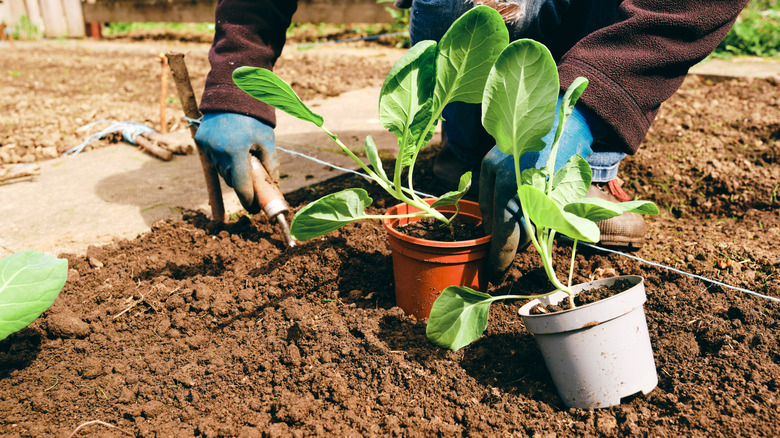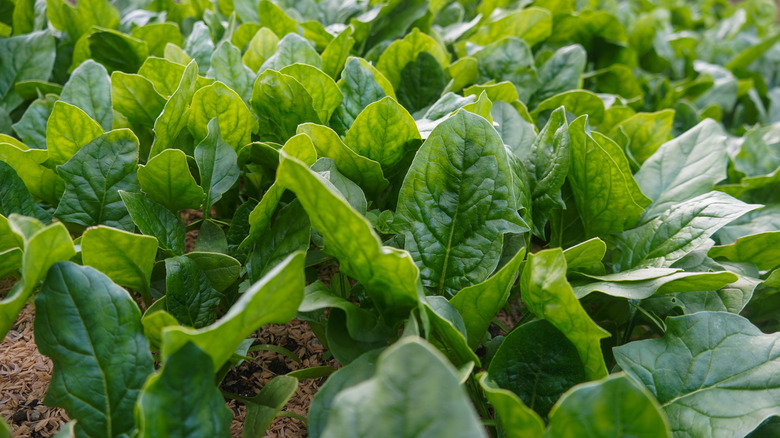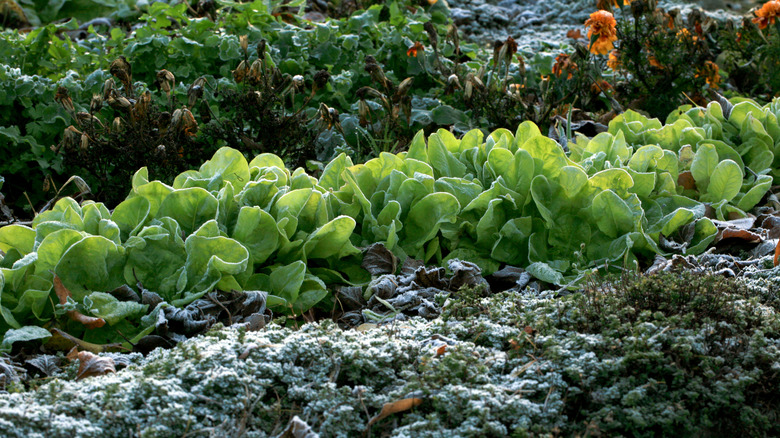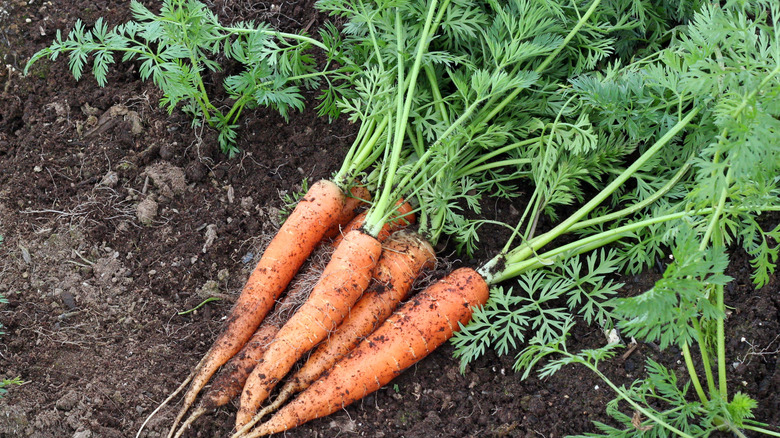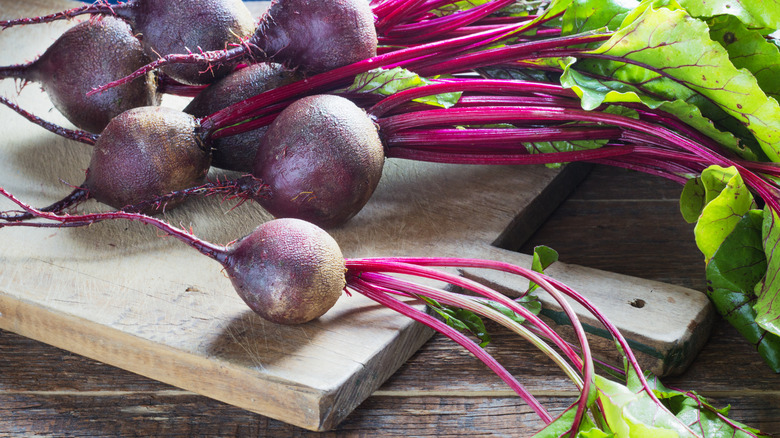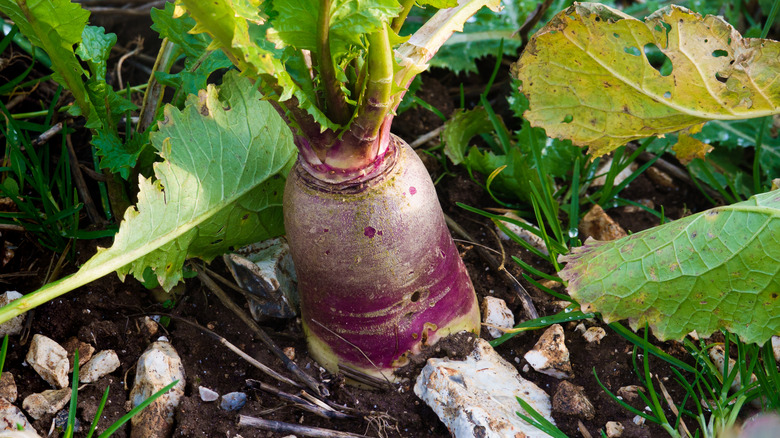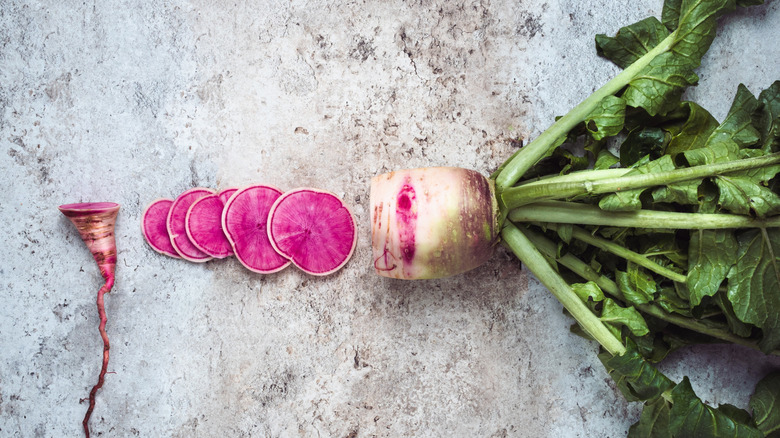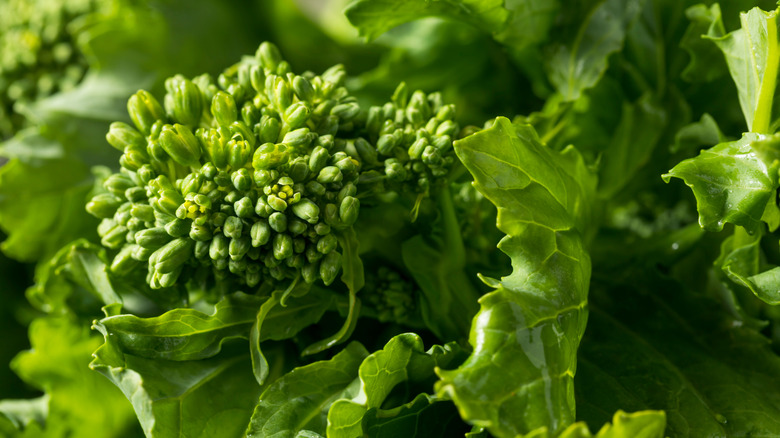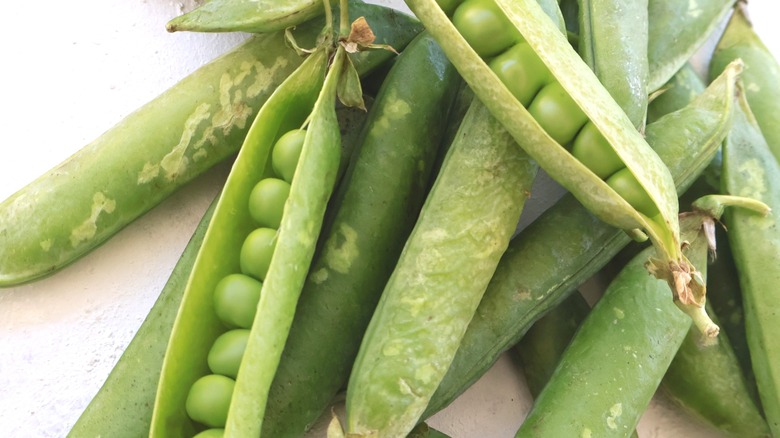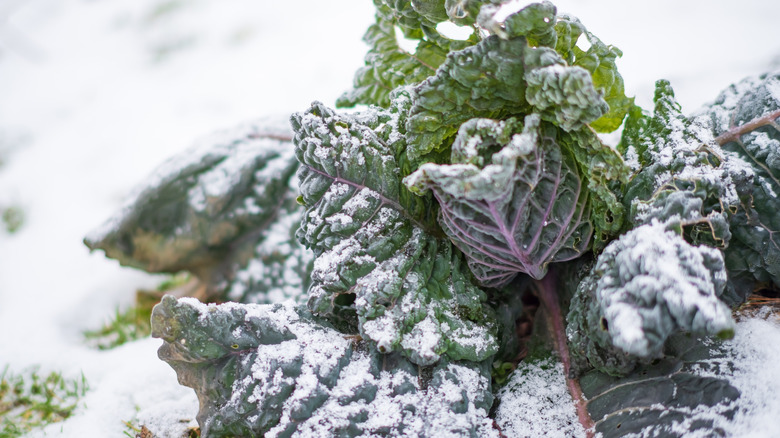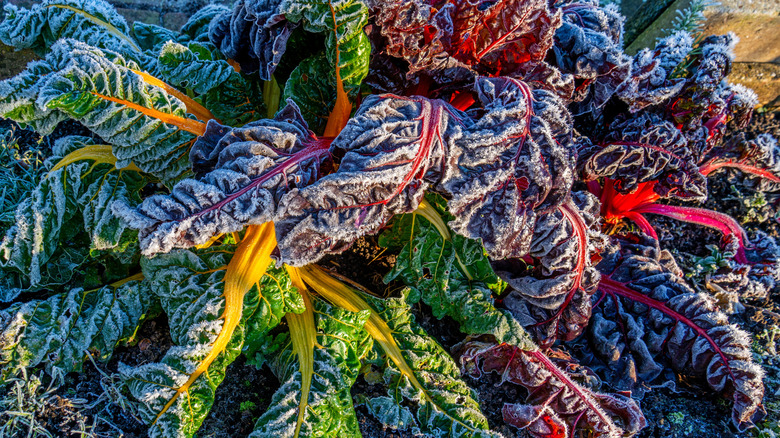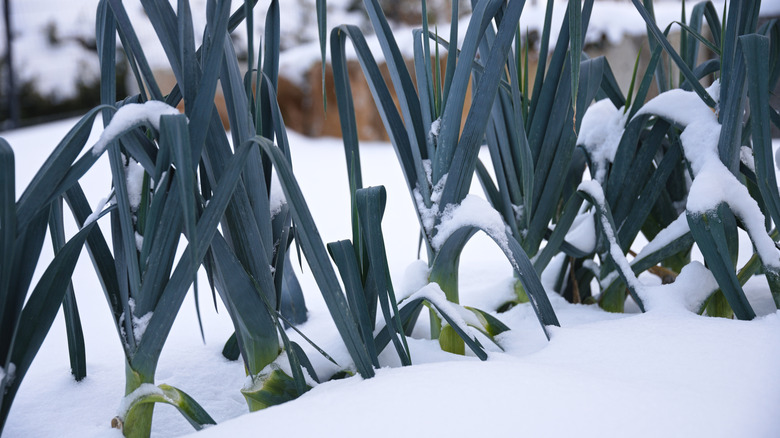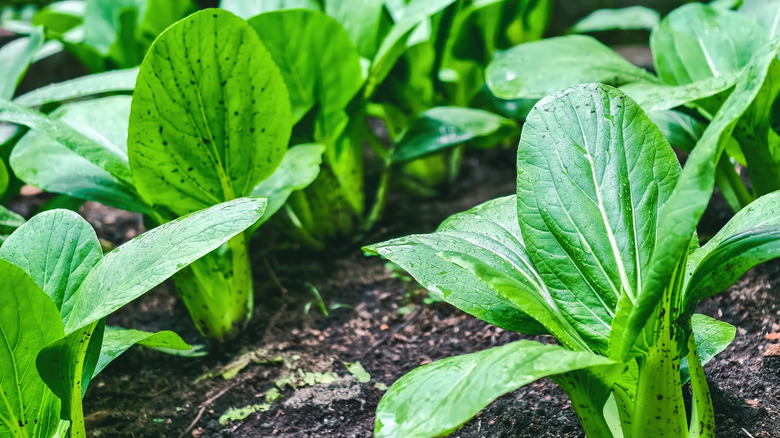12 Vegetables You Can Plant In November For Crops Through Winter
Contrary to what most people may think, gardening doesn't have to end for the season with the fall harvest. You don't even have to be a pro gardener to start a backyard winter garden. And you'd be amazed by how many vegetables you can plant in November that produce crops through the winter. Besides the well-known cold-weather crops like carrots, lettuce, and spinach, you can also grow peas and even beets. Winter gardens can be a great way to get fresh produce even when it's snowing. Because it's the off-season for most gardeners, you might also be able to get some great deals on seeds and starts. And it's a great way to level up your gardening skills.
For the best results with a winter garden, you have to know which plants work for your USDA Hardiness Zone. You also want to make sure to add the extra care that some veggies require to thrive in cooler weather. You can use season-extenders like hoop covers or cold frames as well, to help your winter plants thrive. After knowing which plants grow well in your zone, you will need to know which veggies do better from starts or the ones that are best direct-sown from seeds. There are also some specific varieties of each vegetable that are better suited for winter gardens — generally, they have shorter growing times. Once armed with a little knowledge, winter gardening can be just as easy as planting in the spring. As an added benefit, cold weather can make certain crops taste a little sweeter, and you won't have to worry about slugs.
Spinach
Spinach is probably one of the easiest vegetables to grow in winter, considering its seeds will not germinate if the soil is warm, and it's unlikely to bolt. It grows well in USDA Hardiness Zones 3 through 9. For the best winter harvest, you will want to sow spinach seeds about a month before the darkest day of the year. One of the ways you can help your spinach survive harsh winter weather is to add straw around the base of your plants, and if you live in a cooler region, you should use a cold frame.
Lettuce
Lettuce is a great veggie to plant in the fall for produce throughout the winter. It works especially well for people with smaller spaces, because it does well in containers. If you live in zones 4 through 9, you can grow a variety of lettuce types. However, in colder zones, it's best to use cold frames. In zones 5 through 7, you'll need to add mulch, and in zones 8 through 10, you can plant as you normally would. Red lettuce varieties are more cold-tolerant than green varieties, making them a great choice for beginner winter gardeners.
Carrots
Carrots are sometimes considered one of the more difficult vegetables to grow. Some reasons for this are soil compaction and weed competition. Thankfully, if you're planting them in the fall, only one of those issues is a possible problem — soil compaction. You can prevent this by making sure your soil is loose and airy, monitoring moisture, and mulching deeply. If you live in zones 8 through 11, now is the time to plant your carrots for winter harvests. You can avoid a lot of mistakes when trying to grow carrots in the winter by choosing cold-hardy, short-season varieties.
Beets
Like most root vegetables, beets need to be direct-sown. If you live in warmer regions of the U.S. (zones 8 through 11), you can sow normally in November for a winter harvest. But, if you live in cooler zones (3 through 7), you should use a deep mulch, a cold frame, or row covers. Because beets are a root vegetable, you need to make sure the soil is loose and airy. Beets also need consistent watering to keep their soil moist.
Turnips
Turnips are another great cold-hardy root vegetable. They love full sun and need it to grow properly. Like beets, they need airy soil that stays moist, so they don't dry out and get woody. If you live in colder regions, turnips benefit from a cold frame, deep mulch, or row covers. You can choose some great varieties that will help ensure success for a winter harvest, like 'Hakurei' or 'Scarlet Queen Red Stems'. Turnips store easily and are a great vegetable to grow if you want greens and root veggies through winter because the greens are edible, too.
Radishes
If you're not a fan of the spicy taste of summer radishes, you might enjoy a winter-grown variety. Like many veggies on our list, radishes get a sweeter/milder taste after a frost. Radishes are also perfectly suited for planting in November, because they have one of the shortest growing periods of the veggies on our list — although winter varieties take a little bit longer than spring ones. Because they're a root veggie, radishes like a light soil with a good amount of organic matter, full sun, and consistent watering. Two great winter varieties are 'Watermelon' and 'Japanese Long Scarlet'.
Broccoli raab
Broccoli raab, also known as broccoli rabe, can be successfully planted in November for winter harvests in zones 3 through 10. This member of the brassica family enjoys full to partial sun, moist but well-drained soil, and a little mulching if you expect early freezes. It is one of the easiest vegetables to grow on our list, which is perfect for beginner winter gardeners. 'Quarantina' is a great variety to grow for winter, with a very short time to maturity.
Peas
Peas are an exceptionally cold-hardy veggie, and many people don't realize they can be planted before the first frost. If you feel the need, you can use frost protection measures to shelter the blooms and growing pods from freezes. Peas can be grown in zones 2 through 11. They do best in sunny locations with well-draining soil. Some of the best winter pea varieties are 'Avola', 'Feltham First', and 'Glory of Devon'. Although warmer zones will have an easier time planting peas in November for winter harvesting, colder regions can grow them with just a little extra care.
Kale
For zones 8 and 10, planting kale in November is a breeze, with no extra care needed. For colder regions, it is possible, but using a cold frame or tunnel is recommended for the best harvests in winter. Kale needs time to establish before deep freezes happen, which is why it's a good idea to use season extenders. For the best success, you should pick varieties that do well growing in late fall or early winter, like 'Darkibor', 'Red or White Russian', or 'Winterbor'.
Swiss chard
It's a little late to plant Swiss chard for winter harvest if you live in anything colder than zone 8. Although it is still possible to plant Swiss chard in November if you live in Zones 9 through 11. You can try it in colder zones with season extenders like cold frames or hoop houses, but just remember that chard will die if temperatures are below 15 degrees Fahrenheit. Plant in full sun with well-draining soil, and avoid overwatering — chard does not like saturated soil.
Leeks
Leeks are a tasty variety of alliums that are very cold-hardy. They do well if planted in November in zones 7 and higher with minimal effort. But if you live in the cooler regions of the U.S., you should provide them with some protection and a thick layer of mulch. Plant them as starts in well-draining soil, where they will get at least 6 hours of sun a day. Some great cold-hardy varieties that will do well are 'Giant Musselburgh', 'Bandit', and 'Otina'.
Bok Choy
Bok choy is another brassica that does well in colder temperatures. If you live in zones 8 or higher, you can plant bok choy now without any cold protection measures. If you live in Zones 4 through 7, you can still grow bok choy — you just need to use some form of frost or snow cover. Bok choy grows quickly, and it can be harvested as soon as the leaves fully develop. This veggie loves full to partial sun, and be sure to plant it in rich, well-draining soil.
